

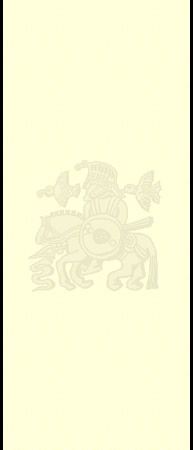

| Web site design by Akikaze Media Services, webhosting by Factorof4.net All content of this site, unless otherwise noted, is copyright ©2001 Robert Bly. All Rights Reserved. Any duplication, in any form without the written consent of the copyright holder is prohibited. |
Selected Poems of James Wright
This posthumous selected poems is the first ever drawn
from James Wright's work. Edited by Robert Bly and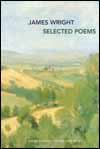 Anne Wright, Selected Poems amply demonstrates Wright's enduring brilliance and importance as one of American poetry's great originals. As Bly points out in his insightful introduction, Wright's early poems were models of clarity and precision. Wright's poetry darkened as he directly confronted the pathologies of American society and history in his mature period, bringing in, as Bly notes, "depth and fierceness." Although Wright did not live long, he lived long enough to break through to a final stage in which his poems, many of them set against the backdrop of Italy, took on a kind of Mediterranean sun-struck luminosity. Above all, says Bly, Wright had a "genius in language," which this welcome, overdue selection presents to a new generation of readers.
Anne Wright, Selected Poems amply demonstrates Wright's enduring brilliance and importance as one of American poetry's great originals. As Bly points out in his insightful introduction, Wright's early poems were models of clarity and precision. Wright's poetry darkened as he directly confronted the pathologies of American society and history in his mature period, bringing in, as Bly notes, "depth and fierceness." Although Wright did not live long, he lived long enough to break through to a final stage in which his poems, many of them set against the backdrop of Italy, took on a kind of Mediterranean sun-struck luminosity. Above all, says Bly, Wright had a "genius in language," which this welcome, overdue selection presents to a new generation of readers.
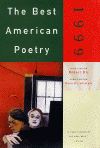 The Best American Poetry, edited annually by an outstanding American poet under the direction of series editor David Lehman, has, in its first decade, become our most respected national anthology. The 1999 entry, edited by Robert Bly, is, without doubt, the finest in the series to date. Bly sifted through literally hundreds of poetry journals to choose the 75 poems that sparkle on these pages. Poets you'll find here are Galway Kinnell, William Stafford, Donald Hall, Mary Oliver, Sharon Olds, and Louis Jenkins, to name just a few of the better known. Bly's introduction, a bracing "State of the Nation" assessment of current poetry, stands with his best literary essays. While such anthologies can't hope to be definitive, there is enough of the "best" in this fascinating collection to amply represent the richness of American poetry today.
The Best American Poetry, edited annually by an outstanding American poet under the direction of series editor David Lehman, has, in its first decade, become our most respected national anthology. The 1999 entry, edited by Robert Bly, is, without doubt, the finest in the series to date. Bly sifted through literally hundreds of poetry journals to choose the 75 poems that sparkle on these pages. Poets you'll find here are Galway Kinnell, William Stafford, Donald Hall, Mary Oliver, Sharon Olds, and Louis Jenkins, to name just a few of the better known. Bly's introduction, a bracing "State of the Nation" assessment of current poetry, stands with his best literary essays. While such anthologies can't hope to be definitive, there is enough of the "best" in this fascinating collection to amply represent the richness of American poetry today.
The Soul Is Here for Its Own Joy: Sacred Poems from Many Cultures
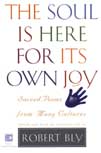 The third in Bly's trilogy of large anthologies, this one focuses on the sacred as human beings have praised it in poetry over the centuries. It contains poets as diverse as Rumi and Hart Crane, Hadewijch of Antwerp and Jane Kenyon, demonstrating the many ways poets have written about (and often argued with) God. As with Rag and Bone, this book covers a lot of ground; some of the sections are "Starting on the Path," "Dying to This World," and "Loving God Through Loving a Woman or a Man." This volume is especially rich in Bly's own translations.
The third in Bly's trilogy of large anthologies, this one focuses on the sacred as human beings have praised it in poetry over the centuries. It contains poets as diverse as Rumi and Hart Crane, Hadewijch of Antwerp and Jane Kenyon, demonstrating the many ways poets have written about (and often argued with) God. As with Rag and Bone, this book covers a lot of ground; some of the sections are "Starting on the Path," "Dying to This World," and "Loving God Through Loving a Woman or a Man." This volume is especially rich in Bly's own translations.
The Darkness Around Us Is Deep: Selected Poems of William Stafford
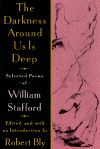 At the time William Stafford died in 1993, Robert Bly was in the midst of editing the first selected poems from Stafford's published enormous oeuvre. The spare collection that resulted preserves the majority of Stafford's greatest poems, and is an ideal introduction to Stafford for newcomers. Bly groups Stafford's poems according not to chronology but to themes such as "Mother's Voice and Father's Voice," "Speaking the Native American Part in Him," and "The Refusal to Serve War." Bly's introduction, "William Stafford and the Golden Thread," will richly reward anyone seeking insights into Stafford's writing method and sources.
At the time William Stafford died in 1993, Robert Bly was in the midst of editing the first selected poems from Stafford's published enormous oeuvre. The spare collection that resulted preserves the majority of Stafford's greatest poems, and is an ideal introduction to Stafford for newcomers. Bly groups Stafford's poems according not to chronology but to themes such as "Mother's Voice and Father's Voice," "Speaking the Native American Part in Him," and "The Refusal to Serve War." Bly's introduction, "William Stafford and the Golden Thread," will richly reward anyone seeking insights into Stafford's writing method and sources.
The Rag and Bone Shop of the Heart: Poems for Men (with James Hillman and Michael Meade)
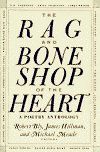 The idea for this gargantuan collection was to gather poems Bly, Hillman and Meade had been using for years in their work with men, but in the editing grew far beyond those limits. Arranged according to such themes as "The House of Fathers and Titans," "The Naive Male," and "The Cultivated Heart," this is the deepest and most varied anthology of poems about the male experience ever assembled, and some consider it the greatest poetry anthology of any kind to be published in the past few decades. The range of poets and cultures represented is staggering. This is a cornerstone book in any contemporary poetry library.
The idea for this gargantuan collection was to gather poems Bly, Hillman and Meade had been using for years in their work with men, but in the editing grew far beyond those limits. Arranged according to such themes as "The House of Fathers and Titans," "The Naive Male," and "The Cultivated Heart," this is the deepest and most varied anthology of poems about the male experience ever assembled, and some consider it the greatest poetry anthology of any kind to be published in the past few decades. The range of poets and cultures represented is staggering. This is a cornerstone book in any contemporary poetry library.
The Winged Life: The Poetic Voice of Henry David Thoreau
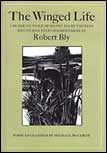 This superb selection juxtaposes Thoreau's poems with resonant entries from his prose work, to reveal him "as the fully realized literary artist and complex personality he was." Too often, says Bly, we think of Thoreau only as the advocate of simple living who wrote Walden. Bly's selection from Thoreau's poems, essays and journal entries wonderfully enlarges our picture of Thoreau as wit, naturalist, and spiritual thinker. Bly's insightful prose introductions nearly match Thoreau's in eloquence. A series of wood engravings by Michael McCurdy make this one of Bly's most handsomely presented books.
This superb selection juxtaposes Thoreau's poems with resonant entries from his prose work, to reveal him "as the fully realized literary artist and complex personality he was." Too often, says Bly, we think of Thoreau only as the advocate of simple living who wrote Walden. Bly's selection from Thoreau's poems, essays and journal entries wonderfully enlarges our picture of Thoreau as wit, naturalist, and spiritual thinker. Bly's insightful prose introductions nearly match Thoreau's in eloquence. A series of wood engravings by Michael McCurdy make this one of Bly's most handsomely presented books.
News of the Universe: Poems of Twofold Consciousness
 The first of Bly's three great anthologies, News of the Universe gathers 150 poems illuminating "the idea that human consciousness is only one of many kinds of consciousness operating in the universe. Bly traces an evolution in poetry since the 18th century–epitomizing a time of alienation from nature and literary preoccupation with self–toward poems that...seek the sources of all consciousness, in the molecules of the galaxies and the cells of other creatures." This inclusive and mind-expanding volume also features a fascinating series of essays on attitudes toward nature as reflected in Western poetry.
The first of Bly's three great anthologies, News of the Universe gathers 150 poems illuminating "the idea that human consciousness is only one of many kinds of consciousness operating in the universe. Bly traces an evolution in poetry since the 18th century–epitomizing a time of alienation from nature and literary preoccupation with self–toward poems that...seek the sources of all consciousness, in the molecules of the galaxies and the cells of other creatures." This inclusive and mind-expanding volume also features a fascinating series of essays on attitudes toward nature as reflected in Western poetry.
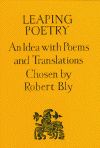 Originally published as the first and only Seventies number of Bly's literary magazine, Leaping Poetry still comes as close as anything Bly has yet written to a comprehensive commentary on the principles driving his own poetry. Part essay and part anthology, this amazing brief book opens with "Looking for Dragon Smoke," in which Bly expresses his disappointment with the unimaginative quality of much recent Western poetry. He looks elsewhere, to the Spanish and South American poets especially, for that "leaping" that can take place in the poem between different areas of the psyche. This book is crucial in understanding Bly's thought on art.
Originally published as the first and only Seventies number of Bly's literary magazine, Leaping Poetry still comes as close as anything Bly has yet written to a comprehensive commentary on the principles driving his own poetry. Part essay and part anthology, this amazing brief book opens with "Looking for Dragon Smoke," in which Bly expresses his disappointment with the unimaginative quality of much recent Western poetry. He looks elsewhere, to the Spanish and South American poets especially, for that "leaping" that can take place in the poem between different areas of the psyche. This book is crucial in understanding Bly's thought on art.
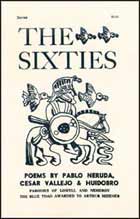 For
years Hobart and William Smith College Press, in association with the Seneca
Review, has made available inexpensive facsimile reprints of all ten issues of Bly's iconoclastic literary magazine, first The Fifties and later The Sixties, edited in western Minnesota with literary co-conspirator William Duffy. Considering the high prices the originals now command on collectors' markets, these sturdy reprints are a steal. Every lively issue is packed with poems, translations, literary essays, parodies and angry letters to the editors, making them like nothing before or since their time. It's no exaggeration to call them a kind of small revolution in American literary publishing.
For
years Hobart and William Smith College Press, in association with the Seneca
Review, has made available inexpensive facsimile reprints of all ten issues of Bly's iconoclastic literary magazine, first The Fifties and later The Sixties, edited in western Minnesota with literary co-conspirator William Duffy. Considering the high prices the originals now command on collectors' markets, these sturdy reprints are a steal. Every lively issue is packed with poems, translations, literary essays, parodies and angry letters to the editors, making them like nothing before or since their time. It's no exaggeration to call them a kind of small revolution in American literary publishing.
The Thousands, Number One, 2001
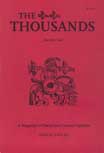 The Thousands #1 updates Robert Bly’s legendary literary journal, successively called The Fifties, The Sixties, and The Seventies, into the 21st century. Including many features familiar from earlier incarnations of the journal, The Thousands leads off with Robert Bly’s major literary essay, "Six Disciplines That Intensify Poetry," available nowhere else. Also in the tradition, the pseudonymous Abou Ben Adams contributes an incisive, thorough appreciation of Jane Hirshfield’s poetry. As one would expect, good poems abound, from near (Louis Jenkins, Li-Young Lee, Jay Leeming, Thomas R. Smith, Louis Simpson, Myra Shapiro, Sharon Olds and Russell Edson) and far (Bhartrihari, Tomas Tranströmer, Hafez). Of special note is a previously unpublished poem by James Wright. Available through Ally Press.
The Thousands #1 updates Robert Bly’s legendary literary journal, successively called The Fifties, The Sixties, and The Seventies, into the 21st century. Including many features familiar from earlier incarnations of the journal, The Thousands leads off with Robert Bly’s major literary essay, "Six Disciplines That Intensify Poetry," available nowhere else. Also in the tradition, the pseudonymous Abou Ben Adams contributes an incisive, thorough appreciation of Jane Hirshfield’s poetry. As one would expect, good poems abound, from near (Louis Jenkins, Li-Young Lee, Jay Leeming, Thomas R. Smith, Louis Simpson, Myra Shapiro, Sharon Olds and Russell Edson) and far (Bhartrihari, Tomas Tranströmer, Hafez). Of special note is a previously unpublished poem by James Wright. Available through Ally Press.